
POLYCORIA (Pathological condition of human eye) YouTube
The primary symptom of polycoria is the appearance of two pupils. Other signs and symptoms of polycoria may include: Blurred vision in the affected eye. Poor, dim, or double vision in the affected eye. An oblong shape of one or all additional pupils. Issues with glare. A bridge of iris tissue between the pupils.

Is Polycoria a myth? Here’s all you need to know about it!
Polycoria is an extremely rare eye disease in which a patient has multiple pupils in one eye. In cases of true polycoria, each pupil reacts to light and functions independently of the other one. This guide to polycoria explains the difference between true and false polycoria, how polycoria may affect vision and how the condition can be treated.
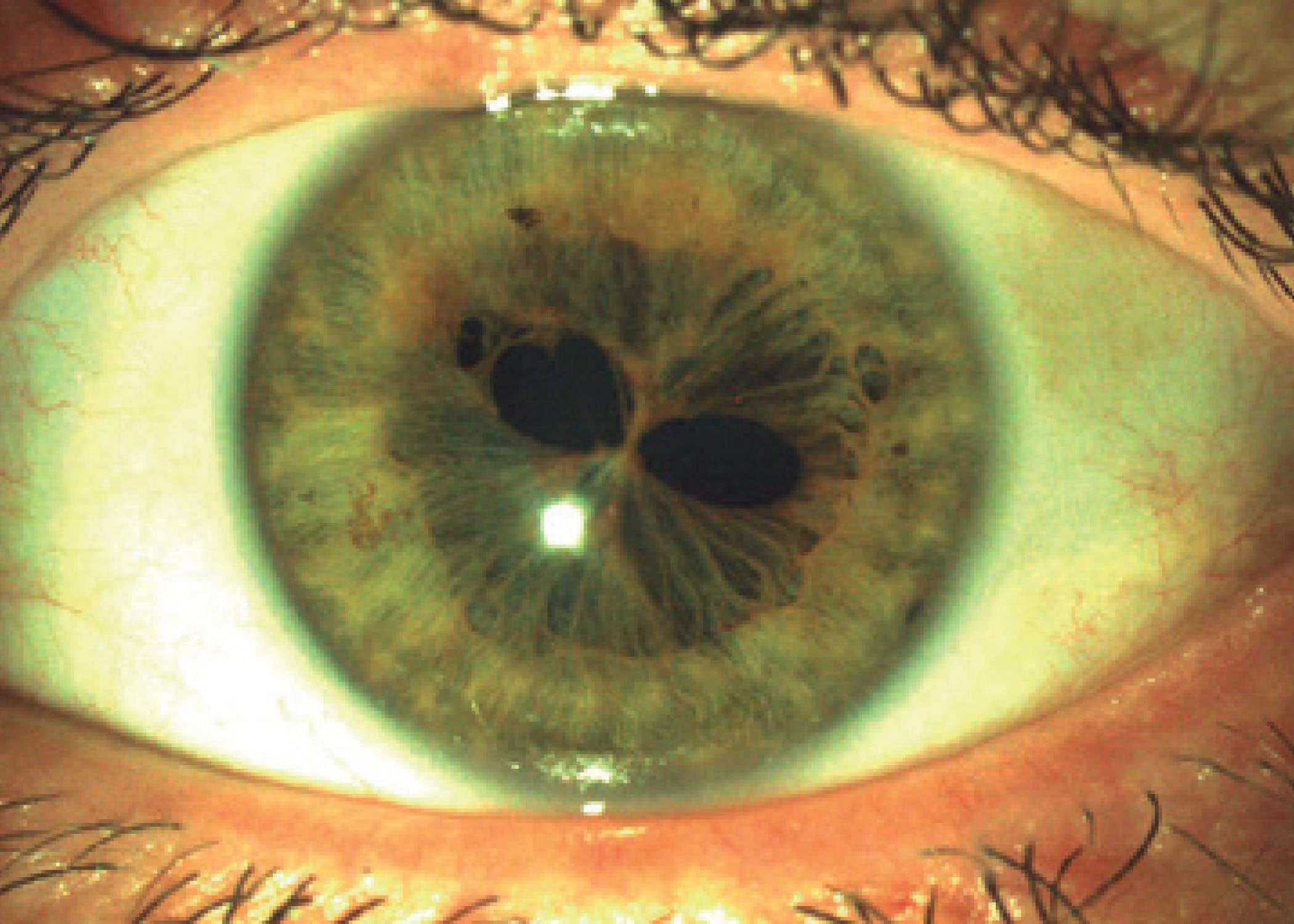
POLYCORIA
True polycoria is extremely rare 7 and can be described as more than one pupillary opening in the iris and is defined by an additional pupil surrounded by an intact sphincter muscle. 1 There are a few theories on why true polycoria manifests: abnormal segregation of a portion of the pupil margin, partial closure of a coloboma, differentiation.

SciELO Brasil Pupilloplasty in a patient with true polycoria a case report Pupilloplasty in
Polycoria, corectopia, iris hole formation, ectropion uveae, and iris atrophy are all common findings at the time of examination. Figure 2. Polycoria, iris hole formation, and corectopia visible on a slit-lamp photo of a patient with Essential / Progressive Iris Atrophy. Note the corneal graft and the edge of a superior conjunctival bleb, as.
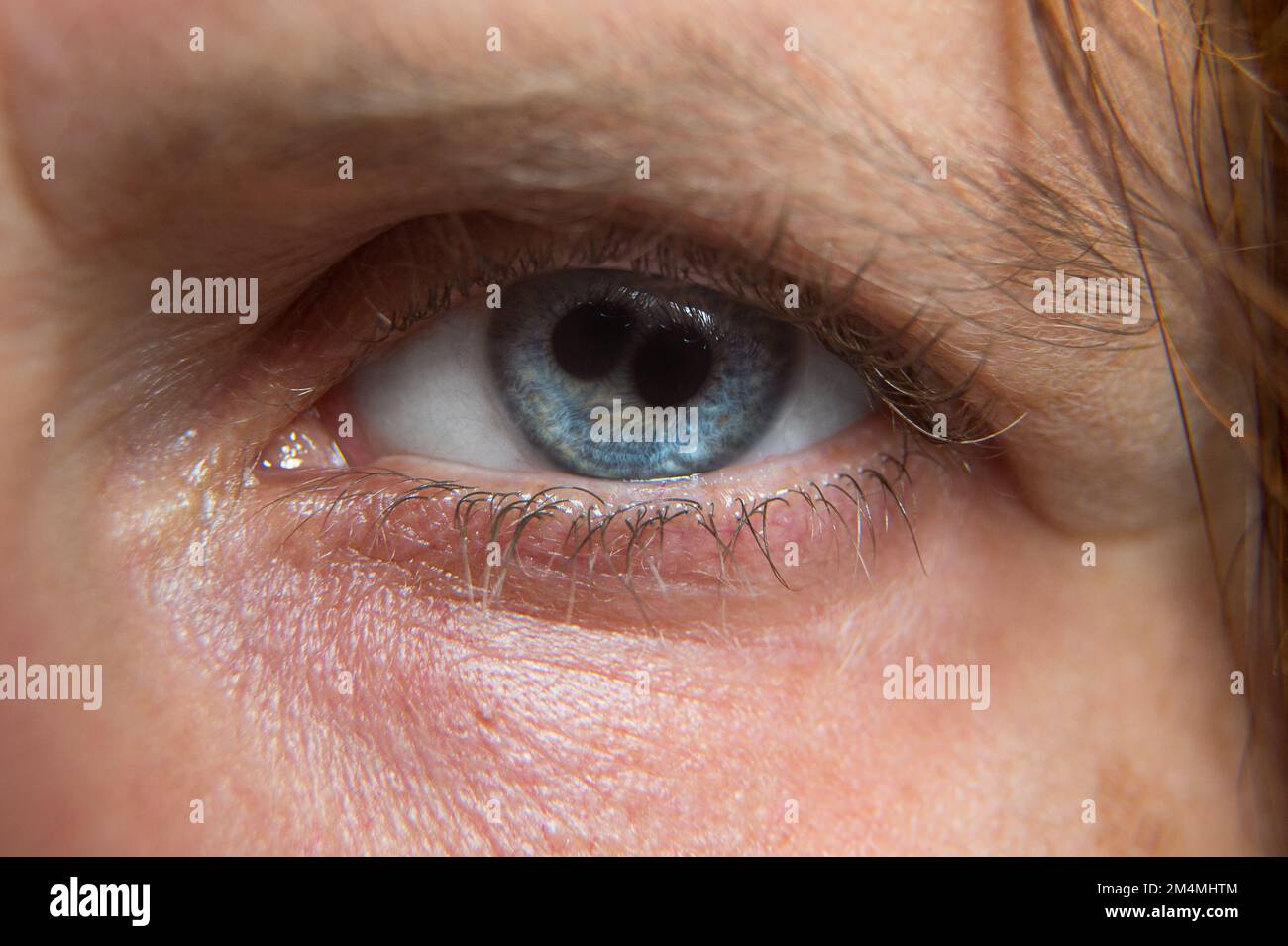
Polycoria hires stock photography and images Alamy
Polycoria: People with "true" polycoria have two or more separate pupils in one or both eyes. Each pupil has its own sphincter muscle and they individually constrict and dilate. This can cause poor, dim or double vision. Surgery can help some people with true polycoria. Other patients have so-called "false" polycoria, where holes in the.
Fig. 5 A) Preoperative image of the right, after pupil dilatation, showing true polycoria, B
Pseudopolycoria juga sering disebut sebagai polycoria palsu. Gejala dan Penanganan Polycoria. Selain ditandai dengan adanya dua pupil atau lebih dalam satu mata, polycoria juga dapat menimbulkan gejala lain. Berikut ini adalah gejala polycoria: Penglihatan kabur pada mata yang mengalami polycoria; Penglihatan ganda, tidak fokus, atau menjadi gelap

Ocular changes observed in AxenfeldRieger syndrome. (a) Corectopia on... Download Scientific
Polycoria is a rare eye condition that can affect either one or both of the pupils, reports Healthline.Though it can present during youth, polycoria may not cause vision issues or be diagnosed.

SciELO Brasil Pupilloplasty in a patient with true polycoria a case report Pupilloplasty in
Polycoria adalah kondisi yang termasuk dalam kelainan pada pupil mata. Orang dengan kelainan ini memiliki lebih dari satu pupil pada salah satu atau masing-masing matanya. Umumnya, polycoria ditemukan pada saat usia kanak-kanak. Namun, tidak jarang gangguan mata yang satu ini baru terlihat saat penderitanya memasuki usia dewasa.
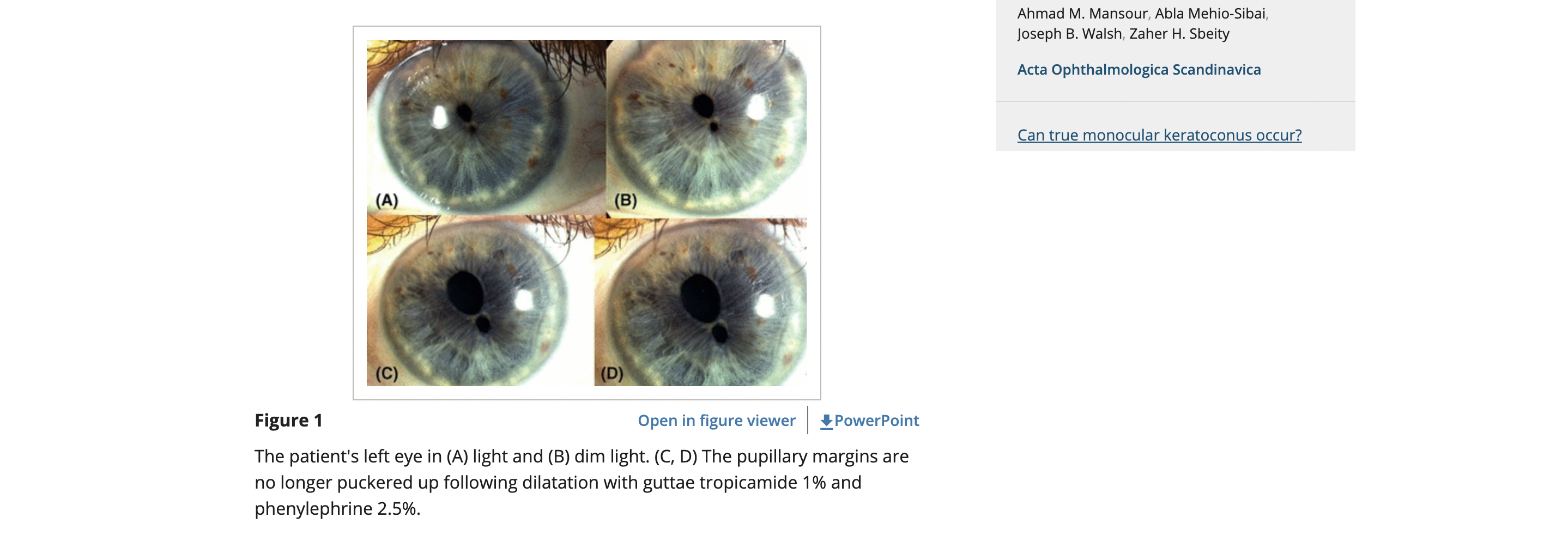
Fact Check Pupula Duplex Is NOT An Eyeball With Two Pupils Clinical Term Is Polycoria Lead
Polycoria is a condition where a person has more than one pupil in each eye. It is a rare condition, occurring in only about 1 in 10,000 people. While it can occur in any race, it is more common in Asians. Polycoria can be present at birth or develop later in life. In most cases, it is a harmless condition and does not affect vision.
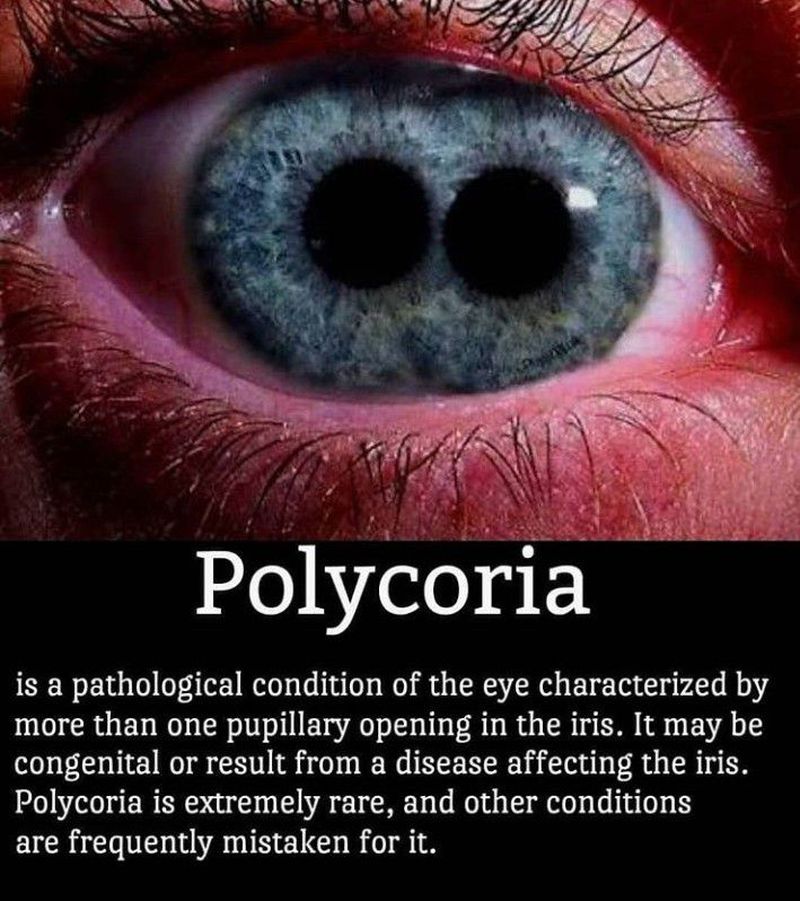
Polycoria A pathological condition of the eye MEDizzy
Polycoria juga dikaitkan dengan dua kondisi mata yang tidak biasa, yaitu: Sindrom Axenfeld-Rieger: Ini merupakan kondisi yang bersifat genetik. Individu dengan kondisi ini mungkin juga memiliki polycoria palsu. Sindrom endotel iridokorneal: Ini adalah kelainan mata yang dapat menyebabkan distorsi iris dan pupil, termasuk polycoria. Pasien.
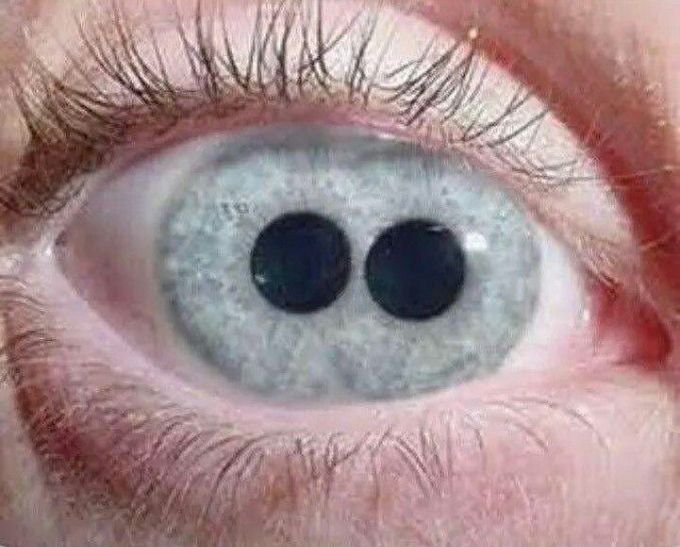
Polycoria MEDizzy
In the simplest terms, polycoria refers to the presence of two or more pupils within a single eye. Each pupil is surrounded by its own iris, the colored part of the eye that controls the amount of light entering by adjusting the pupil size. The existence of multiple pupils in one eye is not just a curiosity; it's a window into the complex and.

Polycoria Causes, Symptoms, and Treatments
The primary sign of polycoria is the appearance of two pupils. Other signs and symptoms may include the following: blurred vision in the affected eye. poor, dim, or double vision in the affected.
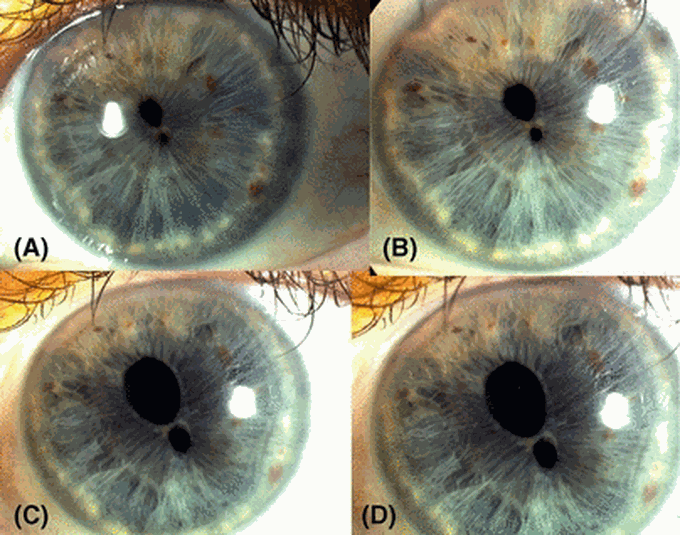
Polycoria An unusual Eye Condition MEDizzy
Tanda-tanda polycoria selain munculnya dua pupil atau lebih, adalah penglihatan kabur, penglihatan ganda, bermasalah dengan silau, atau ada semacam jembatan di bagian iris mata dengan pupil. Penyebab polycoria ini belum diketahui dengan jelas, namun ada beberapa kondisi yang dikaitkan, seperti katarak, glaukoma, perkembangan bannormal pupil.

Polycoria Two Pupils in One Eye The Eye News
Polycoria: This is the medical term for having more than one working pupil in one eye. Argyll Robertson pupil: This term refers to small pupils that get smaller (constrict) correctly when focusing on nearby objects, but not when they're exposed to bright light. Miosis (small pupil): The medical name for very small pupils (constricted) is.

Polycoria... Clinical Anatomy & Operative Surgery Facebook
Polycoria is a pathological condition of the eye characterized by more than one pupillary opening in the iris. [1] It may be congenital or result from a disease affecting the iris. [1] It results in decreased function of the iris and pupil, affecting the physical eye and visualization. In the early history of China, double pupils were seen as a.

Polycoria, miosis, and amblyopia Journal of American Association for Pediatric Ophthalmology
Polycoria is a condition where an eye has - or appears to have - two or more pupils, according to Healthline. With "true" polycoria, each pupil functions independently, constricting or.